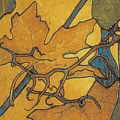storySouth

storySouth is a quarterly online literary magazine that publishes fiction, poetry, criticism and essays. It was founded in 2001, and today enjoys around a thousand page views per day. Enter@Castello di Vezio by Amy Pence can be read here: http://www.storysouth.com/2013/09/enter-at-castello-di-vezio.html Amy Spence is the author of two poetry collections, and was a finalist for both the Tupelo Press’s Snowbound Chapbook Award and the Colorado Prize for Poetry. The poem is too short to quote extensively, and its layout is an integral part of its appeal. It’s a short, fluent account of a falconry ramble in northern Italy, which starts with:
A hush when we enter the falconry-as if
what passes for ghosts are just these forms-
the selves turn their tufted heads.
And concludes with
prey, predator, a quiet so interior
they remain just fleet & temporary housing
for what I may know-when
I cease to know.
In the intervening lines we have precise descriptions of the birds, scenery and local vegetation: unusual, effective and pleasing.
The End of Summer by Jeff Oaks is equally short, but more conventionally laid out. Jeff Oaks is published in several literary magazines, and teaches writing at the University of Pittsburgh. The poem can be read at: http://www.storysouth.com/2013/03/the-end-of-summer.html
Poems need strong beginnings and endings, and the first is certainly achieved here:
Suddenly that great sadness of coats.
Which is then followed precise, almost eidetic imagery of an eye turned on ordinary objects, which personal associations cause to:
Suddenly
will race toward me like a strange horse.
Michael Shewmaker’s have appeared in leading small presses, and he is currently a PhD candidate in creative writing at Texas Tech University. His Harvest can be read here: http://www.storysouth.com/2013/03/harvest.html Again, it’s a simple descriptive poem with many first-rate passages:
the long
silent sweep of the scythe,
Beneath the tilting sun,
the same strict sun of childhood,
bound by the rhythm of
his labor, he ignores
the frailness of his body,
the failing light, his shadow
rising slowly to meet him.
To end as quietly and tellingly as it began:
when, like the grain, he laid
me on the threshing floor.
Michael Meyerhofer is Poetry Editor of Atticus Review, and has several books and chapbooks of poetry to his name. Umbrellas (http://www.storysouth.com/2012/09/umbrellas.html ) has a nice touch of humour, starting:
Poetry is rarely used in windy nations
as it can cause significant property damage
when torn from the owner’s grasp.
From here we are taken on a whistle-stop tour of poetry across time and space, with some excellent observations, possibly tongue in cheek:
Just think: before poetry, you had to
wait indefinitely by the door
To end on a note of seriousness:
There are also legends of spies
disguising their weapons as poems,
a bit of steel or a blast of lead
blossoming wild from that
silky nest, felling whomever failed
to respect the might of words.
The most ambitious, and enjoyable of poems comes from Katherine Soniat, whose Early Life: Triptych can be read here: http://www.storysouth.com/2013/09/early-life-triptych.html Ms Soniat has won many prizes, published six collections of poetry, and teaches in the Great Smokies Writers Program at UNC-Asheville. Tryptych is divided into three sections, entitled Thinasadime, matter and genetics. Thinasadime is a cat, and I quote the first half of section one to show the fluid and exact imagery.
Fish set out for the cat, roof-garden water lilies afloat, she walks to the shore at midnight.
Everything slippery as eel in the marsh. Murk and mirrorsheen of the departed.
Moon over the reeds, she sits cross-legged. The posture of waiting, of winter.
Her inner gaze goes to a party where the man at her table lets his surname drop: Thinasadime.
But this no amateur poetry of your favourite tabby. The cat is driven by its organic makeup and genetics, ferocious and larger than life:
She changes to a limousine-sleekest of the grand vehicles.
War’s torsos spread through grass and into the mountains.
Foresight, hindsight-none of it matters.
Why no roof, she wonders, while brilliance busts up the moon.
To end with the quixotic but haunting:
All a roof can do is
kill you, yells a man by the water lily. Me, you, our whole long line from butchers to the sad
clairvoyants.
